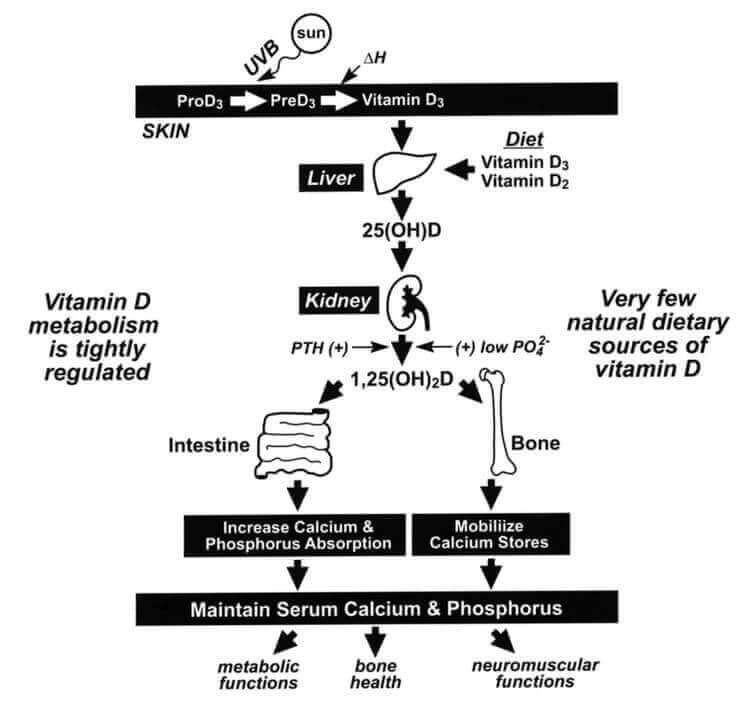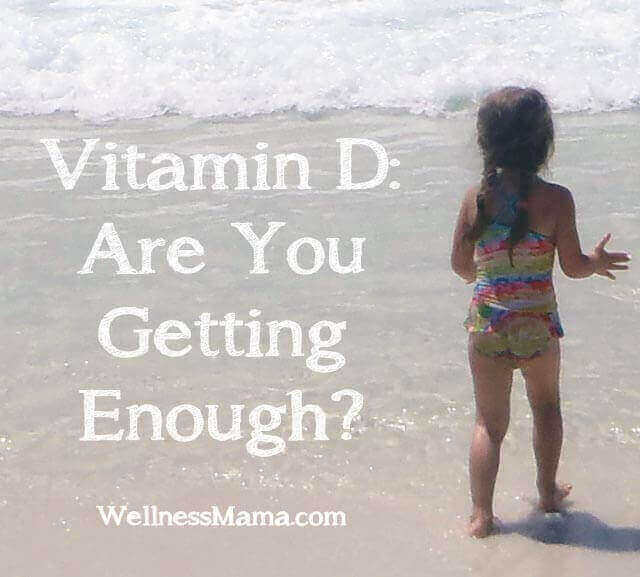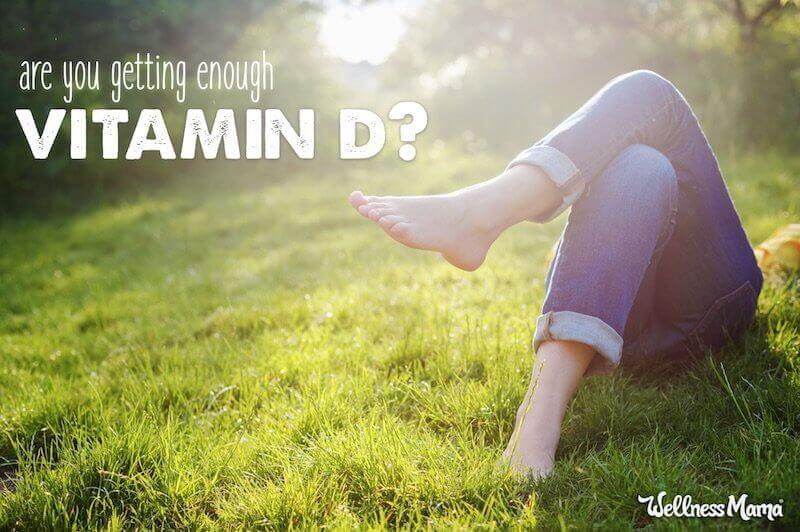It seems like there’s much better awareness these days about the importance of vitamin D. However, the tide of public opinion is yet to shift on the importance of sunlight in this equation. While scientists debate the topic, perhaps we can reach a conclusion with some good old-fashioned logic.
A quick stroll around any Walgreens shows the trend these days to lather on sunscreen to protect against damage from the sun. Sunscreen under your make-up, sunscreen in your make-up, sunscreen for baby, sunscreen for those who are sweating, sunscreen with added tanner… the list goes on!
This would all be well and good, except it isn’t working! Our overuse of sunscreen hasn’t stopped skin cancer at all. (It is actually increasing.) On top of that, people are getting the most dangerous types of skin cancer in places the sun never even touches.
Something here just doesn’t add up…
First, let’s break down what role the sun plays in our biochemistry, and why it is important in the first place.
How We Make Vitamin D From the Sun
For years and years (basically all of human history until the last few hundred years) humans obtained vitamin D from the sun in varied amounts based on proximity to the equator. Obtaining it from food wasn’t really a feasible option, since most foods didn’t have any mentionable level of vitamin D.
So, we all remember from elementary science class that organisms like plants and algae use sunlight for photosynthesis to create oxygen and other important by-products. Sunlight doesn’t work quite the same way for us, but is still just as important. When we are exposed to ultraviolet-B light from the sun or artificial sources, our bodies create vitamin D3, or cholecalciferol photochemically in our skin.
Food sources like fatty fish, eggs, and meat also provide D3. However, once vitamin D enters the body, it is then transported through the bloodstream to the liver where it is converted into the prohormone calcidiol. Calcidiol is then converted by the kidneys or organisms in the immune system into calatinol. Calatinol circulates as a hormone and regulates mineral concentration in the blood (including calcium).
All of this has much to do with the function of major body functions: the neuromuscular and immune systems as well as gene proliferation. This is the reason for the link between deficiency and cancers.
Why Are We Vitamin D Deficient?
There are a couple of reasons why many so many people today experience chronic vitamin D deficiency.
Skin Pigmentation
People who got the most sun exposure because they lived in hot areas of the world developed excess melanin (a darker skin pigment) to block burning while lighter skinned people could produce vitamin D (and a sunburn) a lot more quickly. This system worked really well when in the time when people lived in the same basic area their whole lives, but now a light-skinned person like me could go live in Ecuador or a naturally dark skinned person could move to Moscow.
For this reason, people with lighter skin need less sun exposure to get their vitamin D, while those with darker skin need much more sun to get the same amount.
If you are fortunate enough to be able to get your vitamin D from the sun, your body will tell you how much you need and when you have enough (hello, sunburn). The goal is to get adequate sun and not ever burn. For light skinned people this may be only 15-30 minutes, but darker skinned people may need two hours or more!
More Time Indoors
With all the comforts of modern living (and working so we can earn that living!), our generation spends a lot of time indoors. The most credible statistic I could find comes from an EPA- funded study in the 90s that studied 10 regions over the contiguous United States. They found when it’s all said and done we spend about 90% of our time indoors… and all that time indoors has more downsides for our health than just the lack of vitamin D.
Use of Sunscreen/Lack of Sun
If we do happen to get outdoors, better lather on the sunscreen, right? Not so fast! The chemicals in sunscreen have been linked to cancer themselves (hmmm, could that be the reason for the increasing skin cancer rates?). Chemicals in sunscreens are also found to create free radicals in the body and produce an estrogenic effect (man boobs anyone?).
So how ever do we protect ourselves from over-exposure to the sun? After realizing that most people aren’t getting enough to begin with, the logical answer once you have gotten your sun exposure for the day… get out of the sun! Find some shade, wear some clothes, but get out of the sun. If you are at the beach or on an adventure race, consider a natural sunscreen or a pure zinc oxide formula.
Low Magnesium/Vitamin K
Thanks to modern farming practices that result in poor soil quality, much of our food contains lower levels of magnesium. As a result many of us are deficient in magnesium as well as vitamin D. Magnesium and also vitamin K help activate it in the liver and kidneys, so without enough of these the body may not metabolize the vitamin D you take.
Is Vitamin D Really That Important?
In short: yes! Study after study shows the importance of vitamin D. Deficiencies are linked to problems like:
- Cancer – Vitamin D plays a big role in cancer prevention and treatment. In fact, research is now estimating that 75% of cancers can be prevented by adequate consumption of vitamin D.
- Low Calcium Levels – Vitamin D controls calcium and phosphate levels in the blood and contributes to bone growth and bone strength. That’s because it regulates the absorption and transport of calcium, magnesium, and phosphorus needed for bone mineralization.
- Weakened Immune System – Ever heard of those “t-cells” that protect your body against bacteria and disease? Vitamin D is crucial in their creation and function. Ultimately, this vital nutrient can help keep illnesses at bay.
- Inflammation – Lack of vitamin D can cause inflammation in the body, then again, so can grain consumption. Have joint pain, soreness, or inflammation? Cut the grains and hit the beach!
- Poor Hormone Health – Vitamin D regulates vital components of hormones and neurotransmitters like serotonin. It also helps control cell growth, and can help lower insulin resistance.
Other things to remember:
- Vitamin D helps calcium absorption, but make sure you are getting the calcium from diet or supplements.
- Not getting enough vitamin D is strongly linked to autoimmune disease.
- Deficiency of magnesium can inhibit vitamin D function, so make sure you get that too!
- Eat proteins and fats.
- Eat limited grains.
- Jump into sun exposure slowly if you aren’t used to it, though many people who switch to a no-grain, no polyunsaturated, or hydrogenated oil diet notice a much higher resistance to the sun.
How Much Vitamin D Do We Need?
Vitamin D is much more than just a simple nutrient.
In fact, Vitamin D is absolutely essential. This is especially true for moms, since it is a hormonal precursor. So many women face hormone problems like PCOS, infertility and depression. I venture to say that vitamin D deficiency is a huge part of the puzzle.
Many studies link deficiency of vitamin D to increased incidence of diseases. Ironically, while vitamin D is readily available for free if produced from sun exposure (at least part of the year in most parts of the world), people are surprisingly deficient in it these days. I believe this has everything to do with how much more time we spend indoors (and how we avoid or block the sun when we are outdoors).

These days, health experts propose that vitamin D deficiency is the most rampant and dangerous vitamin deficiency. The amount of vitamin D a person should take varies by person, and a blood test is the only certain way to tell if you are getting the right dose orally (the body regulates this quite well if you are getting it from the sun). You want to get your 25(OH)D levels tested and aim for getting them between 50 and 70.
Experts are now estimating that most people need at least 10 times the suggested RDA (400 IU) of supplemental vitamin D to accomplish this.
Should I Take a Vitamin D Supplement?
What then, is the best way to get this all-important vitamin, the sun or a supplement?
No matter how vitamin D is obtained, it ends up in the exact same form once it hits the liver (as long as the oral form is D3). While I would personally suggest getting vitamin D from the sun if possible because of the other benefits of sun exposure, the most important thing is to just get vitamin D. If sun exposure is not possible or not feasible, supplementing orally is necessary.
How to Get Enough Vitamin D
- Spend a safe amount of time in the sun, but optimize your diet and lifestyle to prevent burning and get out of the sun before skin has a chance to burn.
- Use a cover-up or a safe sunscreen for long sun exposure.
- Get blood levels of vitamin D tested and supplement if needed to get levels in optimal range.
- If necessary, use a vitamin D supplement. I use this brand from Seeking Health or this with additional vitamin K for absorption.
- Make sure to get enough magnesium as well!
This article was medically reviewed by Madiha Saeed, MD, a board certified family physician. As always, this is not personal medical advice and we recommend that you talk with your doctor.
Do you get enough vitamin D? Plan on getting more? Share below!





Leave a Reply